It’s not often a new television show about personal finance starts up and makes a solid point about featuring women. Well, here it is! And it’s not just on cable — Finance is Personal with host Elizabeth Naumovski is on YouTube too.
Elizabeth invited me to speak on her second show where I squawked about debt, FOMO, millennials, loyalty programs, big money wasters, the second-hand economy, and financial literacy. Here’s a sneak preview of what I spoke about:
FOMO and Millennials
The feeling is real, and it can put you into debt. I talked about millennials that use social media, but FOMO can sneak up on Gen-Xers and Boomers too. Don’t think you’re too young or too old to catch the cost of FOMO. Because you can. And it feels terrible.

Fear of missing out (FOMO) is the physical and emotional anxiety you feel when you think you’re missing out on something that’s better than what you already have. Maybe it’s a vacation, a career opportunity, a meal, a social outing (like a party you weren’t invited too but it seems like everyone else is!), or even fashion.
Everyone’s awesome life scrolls past your feed and through their flawless filter, everything looks amazing! But with FOMO is it’s easy to forget that the stuff posted on social media has a cost. You see how much fun your friends or the social influencers are having on Instagram, but the reality is they’ve just blown $50 bucks on breakfast or $500 on clothing. What’s the solution? I share some thoughts in the video. Promise.
Be wary of loyalty programs
We love loyalty programs. Try shopping at any store without being asked for your loyalty card or rewards app at checkout – you can’t. Competition has increased not just for your money, but for your loyalty towards collecting points too. I talk about how much more loyalty program members spend over non-members, and reveal how retailers program us to spend on their schedule. Beware.
I wrote a popular opinion piece on loyalty programs for the CBC: You should be wary of loyalty programs — not enticed by them.
Is it worth it?
Everyone wants to know if this thing or that thing is a deal or a dud. I’m talking more about behavioural finance these days and how it frames our spending decisions. In Is it worth it? I write about something called ‘mental accounting’ and why you’re more likely to spend birthday money from your Grandma and save your pay check. Elizabeth asked me about this post, so I also talked about hay bales and puffy parkas.
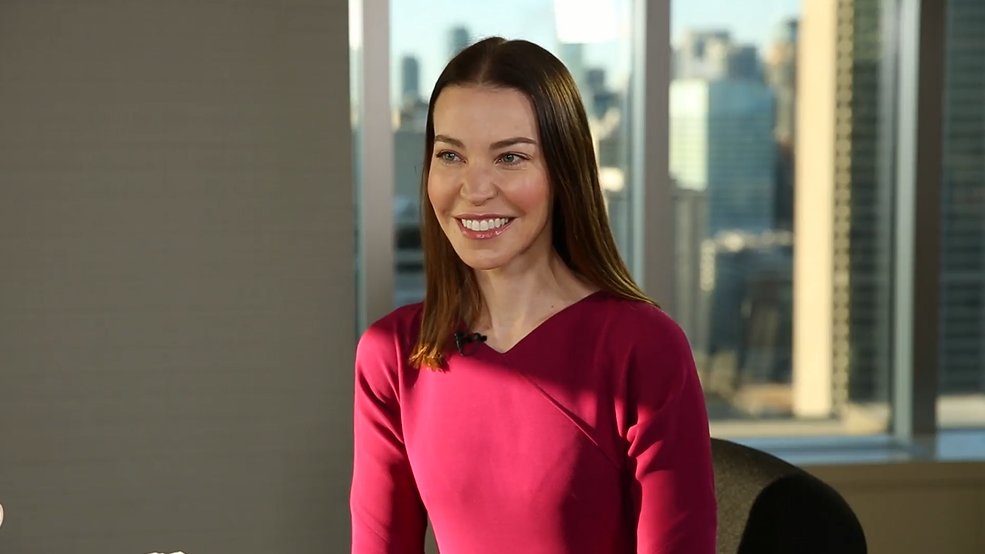
What’s a big money waster?
Eating is an expensive habit. Every year I talk about saving money on groceries with generic brands, buying frozen veggies, and using grocery flyer apps to find sales. These are tips that can save you hundreds a year.
I’m rarely asked to talk about the ONE WAY you can save thousands on food – Don’t throw out your food! Families throw out about 25% of the food they buy, and this can add up to around $2,400 per year!
Want the solution? Check out my Beginner’s Guide to Meal Planning {save time and money} and Track your money with the Free Budget Spreadsheet.
Please check out Finance is Personal with host Elizabeth Naumovski and tell me what you think!
Love love love,
Kerry
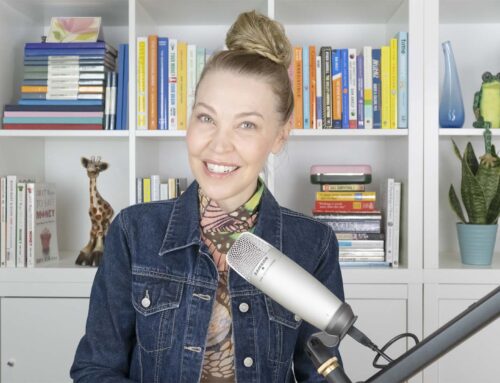
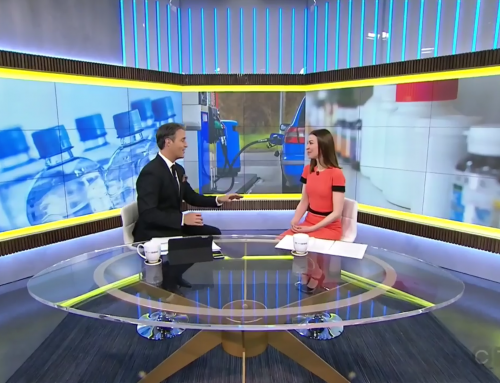

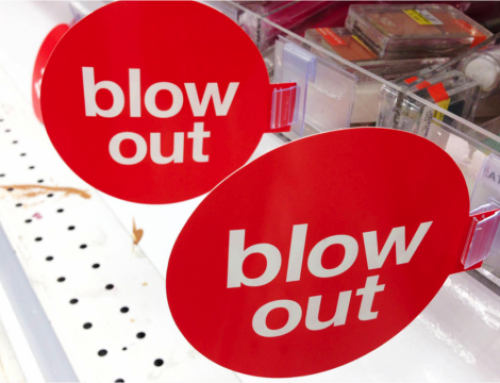
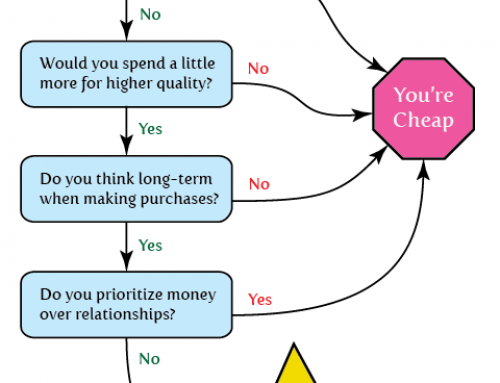
100% stellar as always, you’re amazing, your passion shows through when you speak. You have great ideas and advice. Thank you!
I’m not into loyalty programs, but I do save on groceries more often. Great advice, thank you!
I use my loyality points all the time . I only buy what is needed or on my shopping list. Here are some things I got with them two cars seats for our twins when we had to size up,a new BBQ and sleeping bags for the whole family (5 kids) and and a ipod nano (we still use in the car). Everytime I had to buy diapers and sun screen ( both bald babies) we got points and yes I comparison shopped and used coupons everytime.I havent purchased a turkey for years at xmas and I got all my my soil and mulch for our gardens in the last couple years with which we grow all tomatoes and salad stuff during the summer and fall (saving more money). It just depends how you use your points and when.
You’re looking so pretty <3
As well as wasting their money by throwing out food I think they buy too many brands and packaged food. I’d recommend shopping around the edge of the store mainly around groceries. Not only will you save money but eat more healthily as well!
These are absolutely great tips. I agree with you, a lot of what we spend is for food we don’t even end up eating. It’s just incredibly wasteful all around
I talk about how much more loyalty program members spend over non-members, and reveal how retailers program us to spend on their schedule. — I cannot agree with this more. Often, there’s really a lot of holidays made up by retailers just designed to make the consumer spend more.
Was looking for personal financial management tips and came across this post. It is very helpful and thanks for sharing this. It is true that we spend lot of money on food that we don’t eat. Same goes for other stuff too. It’s important to keep track of things you spend money on. Thanks!
Thanks for the great information Kerry. Much appreciated!!
I totally love your blog 🙂
I LOVE Finance is Personal! I have the PVR set for it all the time! Too many times I have sat across the desk from women who always deferred to their husband in financial matters, and then the time comes where they don’t have a husband anymore, and they are completely lost and overwhelmed. It is my personal passion to empower women in their financial lives!
…..and KIDS…..
Thank you for the post and the caution on loyalty programs. I agree to ‘GreenDollarBills’ comment about shopping the edges of the grocery store. That’s where the real food is. The center is more filled with food made in factories with long shelf lives. By eating the periphery, you are focusing on fruits, vegetables, and fish.
Loyalty Schemes, and by extension loyal points were a great idea! It gets you hooked as a consumer, and gets you getting the best deals! Absolutely amazing!
Whoever came up with them was certainly a pioneer of business!
I love the content you at Squawkfox produce! It is always the best insight on the entire internet!
Thank you- keep it up!
Personally, I don’t really believe that loyalty programs are worth it. Plus, I don’t think they’ll be around much longer, but I do hope that I am wrong about that
I agree with every point you raised in this article!
I especially agree with the last point you made- eating is an expensive habit- am I the only person who wouldn’t eat if they didn’t have to?!
I’ve noticed how much I saved in just keeping track of my expenses. I know some people don’t do that but I just love it and from years with keeping up with this habit – food is where I can save much of my money. As what you’ve just said, “Eating is an expensive habit.
I really love the content on your blog. You are a very wise person who knows exactly what she’s talking about. How about loyality programs? I don’t really use them but I think you are right about them.
Speaking of FOMO and with the markets where they are right now, I feel like I might miss out on getting in at the bottom floor like I did in 2008. What are your thoughts on how far this market can slide?
Hi Ryan, No one can predict the future markets. No one. If someone claims to forecast the bottom, walk away. In fact, run. I rebalance my portfolio twice a year using this tool: Rebalance Portfolio. I’m sincerely more concerned about people’s health these days — health is wealth. Love love love, Kerry